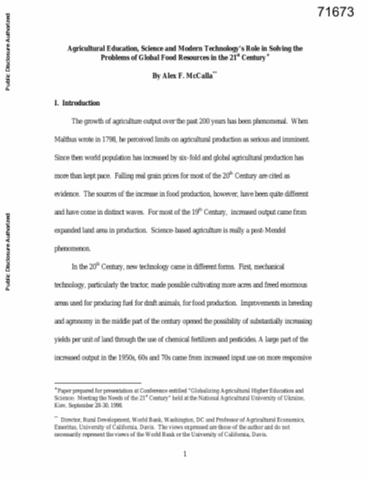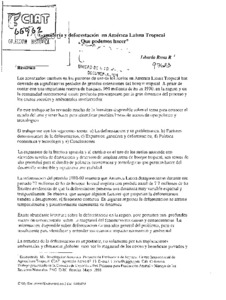Agricultural Education, Science and Modern Technology's Role in Solving the Problems of Global Food Resources in the 21st Century
The growth of agriculture output over the past 200 years has been phenomenal. When Malthus wrote in 1798, he perceived limits on agricultural production as serious and imminent. Since then world population has increased by six-fold and global agricultural production has more than kept pace. Falling real grain prices for most of the 20th Century are cited as evidence. The sources of the increase in food production, however, have been quite different and have come in distinct waves. For most of the 19th century, increased output came from expanded land area in production.
Economic models of tropical deforestation: a review
As international concern over tropical deforestation has grown over the last ten years, researchers have sought to understand the causes of deforestation and possible solutions using quantitative economic models. This book reviews the results and methodology of over 150 of these models and synthesizes the main lessons that can be learned from them. Higher agricultural prices, lower wages, less off-farm employment, and more roads generally lead to more deforestation. Major doubts remain on the impact of technological change, agricultural input prices, household incomes, and tenure security.
Ganadería y deforestación en América Latina Tropical: Qué podemos hacer?
Short-term trends show that livestock production is becoming an increasingly important factor in regional development, possibly because of the combined effect of increasing the forages on offer and planting crops better adapted to the environmental and economic conditions of marginal areas and the decreasing interest of the State in expanding the agricultural frontier. Overall planning of land use should be improved, but to do so, a more detailed characterization and monitoring of deforestation are essential.
Irrigation water management and the Bundala National Park: Proceedings of the Workshop on Water Quality of the Bundala Lagoons, held at IIMI, in Colombo, Sri Lanka 03 April 1998
The main objectives of the workshop were to discuss current insights into the water quality of the Bundala Lagoons, to set priorities for further research, and develop appropriate water management strategies that could improve and sustain the environment of the Bundala Na- tional Park. The workshop brought together a multidisciplinary group of 38 people from 22 governmental and nongovernmental organizations.
The role of non-timber forest products in conservation and development
This paper discusses the assumptions underlying non-timber forest product (NTFP)-based approaches. The authors examine conservation dimensions, highlighting the differences in perceptions among different stakeholder groups about what should be conserved, and development issues, including the role of NTFPs in meeting cultural and subsistence, and in enabling people to deal with increasing integration into market systems. This is followed by an examination of the institutional frameworks that influence pursuit of both conservation and development objectives.







